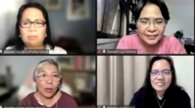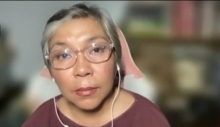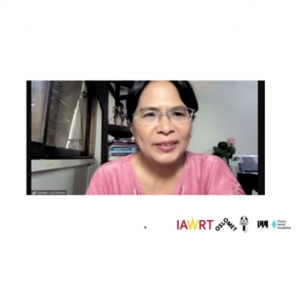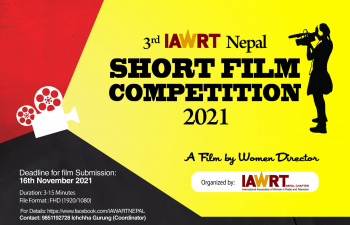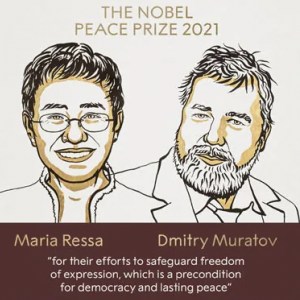The IAWRT Digital Safehouse (DSH) pilot project in the Philippines will build an online platform that will link journalists’ safety programs and efforts.
Third/last in a series on the Roundtable discussion organized by IAWRT Philippines, OsloMet Journalism and Media International Center, in partnership with the Philippine Press Institute and Hanns Seidel Foundation.
by Janness Ann J. Ellao
Gigie Cruz, Filipino photojournalist and editor for ABS-CBN News and former chairperson of the Photojournalists’ Center of the Philippines (PCP), discussed the safety of women journalists in covering the elections amid the pandemic during the roundtable discussion and forum, “Halalan 2022: Ready na ba ang kababaihan sa media?” on October 9.
Women journalists and female journalism/communication teachers and students participated in this online event organized by the International Association of Women in Radio and Television (IAWRT) Philippines and Oslo Metropolitan University (OsloMet) Journalism and Media International Center (JMIC) in partnership with the Philippine Press Institute (PPI) and Hanns Seidel Foundation (HSF).
Cruz emphasized that the safety of women journalists is brought to the fore again as the Philippines prepares for another national election. Citing a study by Dr. Tom Smith, principal lecturer in international relations and terrorism in the University of Portsmouth in the United Kingdom, Cruz said the Philippine elections next year could be “the bloodiest ever.”
I hope that will not happen, but we have to prepare ourselves. Given the forecast that it will be violent, do we step down? We have to find a balance between risk and safety. Women journalists in the Philippines have shown us that there’s always a way to tell our stories.
Gigie Cruz
As it stands, the Philippines is one of the most dangerous places for a journalist, with President Rodrigo Duterte named as one of the world’s 37 press freedom predators of 2021, according to the Reporters Without Borders. Also, during the pandemic, the National Union of Journalists of the Philippines (NUJP) said there were more attempts at silencing journalists through charges of libel, which is a criminal offense in this part of the world.
Cruz recalled that in recent history, among the deadliest attacks against journalists worldwide was the infamous Ampatuan massacre that killed 58 people, where 32 were journalists and media workers. This, she added, happened during the election period.
“It is also important to create safe spaces for women journalists where they can find support from each other, especially when things get rough. I think it is always helpful to have organizations like IAWRT and PCP and NUJP, so you can always have people to have your back in case threats happen,” said Cruz.
Apart from looming violence, the risks amid the COVID-19 pandemic must also be considered by journalists who will be covering the elections. Cruz pointed out that there have been changes in how Filipino journalists have been covering, including the wearing of double masks, the use of longer microphone posts, and physical distancing, to name a few.
In her presentation, Cruz highlighted the importance of assessing the risks and opportunities during pre- and post-coverage and protecting one’s digital security. To prepare for coverage, she said it is important to have a contingency plan, make use of location monitoring applications for the newsroom, and use personal protective equipment.
“We always do risk management. Is the threat bigger than the opportunities? Or are the opportunities bigger than the threats? And then you make a decision: should I stay or should I go?” she said.
Cruz also underlined the need to revisit the rights of journalists. “Before we go out there, we should know our rights. We should know the laws that cover journalists, so every time there is a threat against us, or harassment, we can emphasize to these people that I know my rights and I have the right to cover this story,” she said.
Second in a series on the Roundtable discussion organized by IAWRT Philippines, OsloMet Journalism and Media International Center, in partnership with the Philippine Press Institute and Hanns Seidel Foundation.
by Margarita Valle
Rappler Head of Regions Inday Espina-Varona discussed the importance of amplifying voices of the marginalized and people’s agenda of change for the upcoming elections and beyond during the roundtable discussion and forum, “Halalan 2022: Ready na ba ang kababaihan sa media?” on October 9.
Women journalists and female journalism/communication teachers and students participated in this online event organized by the International Association of Women in Radio and Television (IAWRT) Philippines and Oslo Metropolitan University (OsloMet) Journalism and Media International Center (JMIC) in partnership with the Philippine Press Institute (PPI) and Hanns Seidel Foundation (HSF).
Varona shared her thoughts on how journalists can make a difference, especially during elections. She said 2022 is “an ‘existential’ election” for several reasons.
For one, the veteran journalist who has persistently and painstakingly tackled social issues in her coverage across different government administrations for decades sees the Duterte government as one that is in “disarray.” Citing the slow drop in approval rating in the national surveys and discontent with key governance areas, Varona pointed out that citizens have become critical of the way Duterte tried to sneak into the vice presidency run machinations.
At the same time, the current political maneuverings of the status quo seem to dominate, particularly on social media, where the army of trolls seems to be determined to pursue spreading disinformation and deceit in whatever manner they see fit. However, she cited the “specter of accountability” faced by the president, even as “the ‘opposition’ is equally unwieldy” and there are “too many challengers” dissipating “odds of stopping Duterte’s favored successor and/or proxies.”
She added that the challenge of ending Duterte’s despotic rule seems gargantuan, citing the threat of COVID-19 that continues to hamper grassroots campaigns. Moreover, legacy and digital media battlegrounds only benefit the rich, as the “promiscuous chase for profits by tech companies worsen the problem of disinformation.”
Seeing that “even the most organized blocs of the opposition lack a strategic view of social media” and “parochial and sectarian mindsets trap messages in silos and prevent amplification,” Varona noted that these add up to the mounting challenges that media is facing. The lack of critical consciousness among the so-called opposition has somehow drowned their dissenting voices, making them invisible in their fight.
Varona then presented some strategies for journalists that would “highlight people’s issues” in the current race for government positions. Citing what surveys have revealed about the current national situation with regard to the lack of jobs, loss of income, poverty, hunger, COVID-19, and corruption, she laid out how the media should cover the elections.
Among these are the following tips:
- Go beyond the usual suspects
- Look for authentic voices
- Frame stories on a human scale
- Show how communities are linked by pain and struggle
- Never forget hope
In addition, she suggested that journalists “be conscious of media consumption patterns.”
She encouraged using “live and video shorts (immersive experience) with dramatic photos” and practicing “data and visual journalism,” which helps explain complex issues.
Further elucidating on these strategies, she said issues that directly affect people’s lives need to be highlighted in the election coverage, as these are the political yardsticks that would measure the real intention of the candidates in running for specific positions in government service.
Varona likewise stressed the need for journalists to not only inform the public but more importantly, help the electorate understand issues. Citing the circus that the electoral processes have become for decades, she said the journalists’ most important role in Philippine society today includes engaging audiences, concretizing stories, and helping people understand the context of stories are crucial.
“Always bring a story down to the everyday experience,” she stressed. “That will mean that you are one. You are not separate, you are not above your audience… you are actually with them.”
First in a series on the Roundtable discussion organized by IAWRT Philippines, OsloMet Journalism and Media International Center, in partnership with the Philippine Press Institute and Hanns Seidel Foundation.
by Therese San Diego Torres
Luz Rimban, executive director of the Asian Center for Journalism (ACFJ) at the Ateneo de Manila University, tackled dealing with disinformation and propaganda during the elections in the roundtable discussion and forum, “Halalan 2022: Ready na ba ang kababaihan sa media?” [Elections 2022; Are women in media ready?] on October 9, 2021.
Women journalists and female journalism/communication teachers and students participated in this online event organized by the International Association of Women in Radio and Television (IAWRT) Philippines and Oslo Metropolitan University (OsloMet) Journalism and Media International Center (JMIC) in partnership with the Philippine Press Institute (PPI) and Hanns Seidel Foundation (HSF).
Rimban started the discussion with reflections on the 2022 elections and what is at stake. She underlined the possible return to Malacañang of the family of the late dictator Ferdinand Marcos, as well as the continuous hold on power of President Rodrigo Duterte and his family, whose reasons to remain in power include the official probe of the International Criminal Court (ICC) into alleged crimes against humanity in Duterte’s “war on drugs.”
At the same time, she noted that there are “pro-democracy, freedom-loving Filipinos” who “know that Marcos and Duterte represent the darkest times of the country” and “don’t want a repeat of martial law or a repeat of the past six years.”
Given this context, Rimban noted, “In a race as tight as the one we are having in 2022, we can expect that disinformation and propaganda will go into overdrive.”
Injecting disinformation and propaganda into social media content may be done “subtly” or “covertly” by candidates, their campaigns, and their supporters. While those who have money can spread these on a larger scale, everyone can engage in disinformation and propaganda, which is why journalists and the public must remain vigilant, said Rimban. She acknowledged that because there are no gatekeepers on social media, it has become more difficult for citizens to distinguish between true and false information.
As these types of content continue to surface on social media, Rimban encouraged introspection on how to view and respond to disinformation and propaganda. Acknowledging the power of certain politicians as “masters of disinformation” and the fact that there are “bloggers, influencers, and vloggers who are looking for content,” she invited the participants to look at such content more critically rather than “pick a fight” with content producers.
Disinformation and propaganda are not new, but social media allows these to spread at an unprecedented speed and scale. What Rimban pointed out about encouraging critical thinking helps individuals pause and try to make sense of the bigger picture, rather than get caught up in what disinformation and propaganda spreaders are feeding.
This is also what Rimban underlined during the roundtable discussion, when asked about the issue of “he said, she said” reporting during the elections. She noted that while “there’s a place for breaking news,” it is “also incumbent upon journalists to… take a step back and look at the bigger picture.”
Rimban shared the following ways to deal with disinformation, in particular:
- Fact-check as part of daily work.
- Study election laws, voting procedures, facts and history.
- Correct erroneous narratives within your own circles.
- Promote critical thinking.
- Spread media/social media literacy.
Rimban said doing quality journalism requires knowing how to fact-check and continuously learning about election laws, voting procedures, and related facts and historical information. She also advised sharing fact-check findings and correcting false information within one’s own circles such as in chat groups, as well as promoting how to think critically especially during the elections.
She added that media/social media literacy and fact-checking initiatives must be strengthened, as these are often done in schools and journalists’ circles while other stakeholders are often overlooked. She shared that when ACFJ shared tips with an urban poor community on how to spot falsehoods, the participants were “so excited because nobody had taught it to them before” and were “very keen on getting more information.”
This is a strong reminder for journalists and other stakeholders to expand discussions and engagement on how to deal with disinformation and propaganda.
Event date: 16 November, 2021 – 12:00
IAWRT Nepal opens the call for film entries for their short film competition. This is an opportunity for female film directors. Deadline of submission is on November 16, 2021.
Contact IAWRT Nepal through their Facebook page for more information.
Fellow journalists and press freedom and freedom of expression and information take the spotlight at this year’s Nobel Peace Prize.
The International Association of Women in Radio and Television congratulates fellow journalists Maria Ressa and Dmitry Muratov who jointly won this year’s Nobel Peace Prize.
The Nobel committee awarded this prestigious peace prize to journalists from the Philippines and Russia for their ‘efforts to safeguard freedom of expression’. This, the Norwegian Nobel Committee also deems, is a precondition for democracy and lasting peace.
“Free, independent and fact-based journalism serves to protect against abuse of power, lies and war propaganda,” said Berit Reiss-Andersen, chair of the committee.
The award is accompanied by a gold medal and 10 million Swedish kronor (US $1.14 million)
The recognition comes at a time when journalists are increasingly at risk the world over, especially female journalists in Afghanistan and many other hot spots.
Co-founder of Rappler, a digital media company for investigative journalism, Maria Ressa uses freedom of expression to expose growing authoritarianism in the Philippines.
Dmitry Muratov, on the other hand, is a Russian journalist who founded the Novaya Gazeta, a news agency that is critical in its reporting and has served as its editor-in-chief since 1995.
IAWRT hopes this award becomes an opportunity for fellow press freedom advocates to hold the line and engage governments to protect a free press and to uphold people’s right to know.

